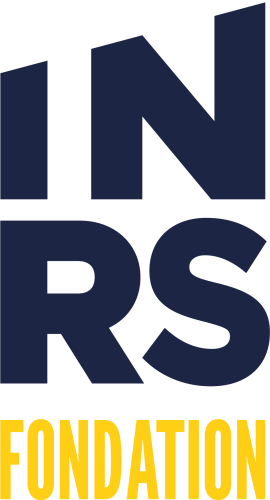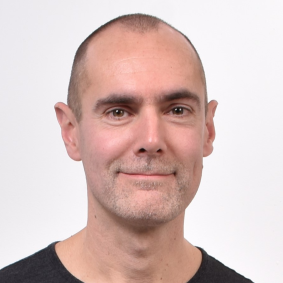Stephan Séjourné
Ph.D. Earth Sciences, 2007
Master's degree in Earth Sciences, 2000
President and founder, Enki GéoSolutions
“When you finish a master's degree or a doctorate, you've mastered a subject, but you don't know everything. You have to be sure of yourself, but remember that, above all, you've learned how to learn. It's this posture that will enable us to solve complex problems and avoid easy solutions.”
A geologist by training, Stephan Séjourné landed at the Institut national de la recherche scientifique (INRS) by chance at the end of a university exchange between France and Quebec, which first took him to Université Laval. Professor Michel Malo then invited him to join a multidisciplinary research project, a field project - with hammer and compass - in Saint-Hyacinthe combining structural analysis and geochemistry of carbonate scales in the Appalachians. His master's thesis in Earth Sciences (2000) paved the way for the rest of his career.
His doctoral studies in Earth Sciences (2007), in the same region but also on the shores of Lake Champlain, were followed by more in-depth research combining his previous approach with the analysis of fluid inclusions and the interpretation of seismic lines. Since then, “I'm interested in everything to do with fluids in the subsurface”, he sums up.
From his “excellent experience” at INRS, Stephan remembers the accessibility and friendliness of the teachers. “I felt like I was part of a big family, and that anything was possible,” he adds. He also developed “independent scientific thinking”. The trusting environment he found at INRS enabled him to “learn fast and try things out”, a culture different from what he had experienced before. According to him, the “small, comfortable and quiet” facilities give INRS a “village atmosphere where everyone knows each other very well”. His research involved a lot of field work, but also laboratory experiments and the use of computer systems, which helped to make him a more complete, agile geologist.
“The notion of interdisciplinarity is very important and relevant to me,” he continues. INRS allowed him to dive headfirst into interdisciplinarity by interacting on a daily basis with INRS scientists, but also with experts from the Geological Survey of Canada, who are housed in INRS's Quebec City offices.
Stephan began his career before completing his doctoral studies. As a geologist with natural gas exploration companies, he carried out consulting mandates, choosing his projects according to his abilities and interests.
He then turned his attention to other resources and forms of energy, such as geothermal energy, hydrogen, helium andCO2 storage. What interests him most is applying his scientific knowledge to the exploration process, in other words, helping to understand and explain why a resource is or isn't present at a given site. His mandates have taken him from one end of Quebec to the other, across Canada and elsewhere in North America, and even to Africa.
In 2017, Stephan founded Enki GéoSolutions, a firm offering consulting services in geological exploration of various natural resources. Lately, he has been particularly interested in natural hydrogen. His clients are exploration companies and R&D organizations. He assists them in developing turnkey exploration programs. Himself an associate professor at INRS, he has been collaborating since 2012 with INRS scientific teams, including honorary professor Michel Malo, whose expertise in structural geology focuses particularly on the Appalachians, professor Jasmin Raymond, an expert in geothermal energy, and professor Geneviève Bordeleau, renowned for her work in isotope geochemistry.
For Stephan, the natural next step is to pursue his work at the crossroads of exploration and scientific research. From the university sector, he appreciates the intellectual rigor, integrity, attention to detail and structured approach, aspects that continue to guide his work and choice of mandates.
He advises students to remain humble: “When you finish a master's degree or a doctorate, you master a subject, but you don't know everything. You have to be sure of yourself, but remember that above all you've learned how to learn. It's this attitude that will enable us to solve complex problems and avoid easy solutions”, he believes.
He also insists on quality: “In my work, I sometimes refer to study reports prepared 40 or 60 years ago, the results of which are still valid and useful. If the data is solid and the research is well done, it will be useful for generations to come. You can't underestimate the impact you leave as a scientist,” he adds. That's why he encourages graduates to publish the results of their master's and doctoral work: “It's our responsibility to share our knowledge,” he concludes.
[Interviewed in June 2024.]

